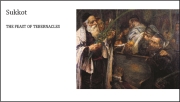 Sukkot, or the Feast of Tabernacles, begins today at sunset. This Jewish holiday, one of seven feasts instituted by God himself, is a seven or eight day celebration depending on if you are celebrating in Jerusalem or outside Israel. In the distant past it could be difficult to know what day exactly the celebration was held on as, like most of the feasts, it starting day was determined by the phase of the moon. If it were a cloudy night, for example, the moon could not be observed, leading to some allowances for those who could not make the journey to Jerusalem. This year it is celebrated during a blood moon.
Sukkot, or the Feast of Tabernacles, begins today at sunset. This Jewish holiday, one of seven feasts instituted by God himself, is a seven or eight day celebration depending on if you are celebrating in Jerusalem or outside Israel. In the distant past it could be difficult to know what day exactly the celebration was held on as, like most of the feasts, it starting day was determined by the phase of the moon. If it were a cloudy night, for example, the moon could not be observed, leading to some allowances for those who could not make the journey to Jerusalem. This year it is celebrated during a blood moon.
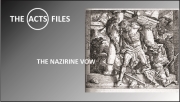 Yesterday we read that just before departing Corinth for home Paul shaved his head. Luke cryptically tells us that this was due to a vow. Just what vow was taken, and why would it involve shaving one’s head? It is best to allow Scripture to interpret Scripture whenever possible, and this is a case where it may be possible.
Yesterday we read that just before departing Corinth for home Paul shaved his head. Luke cryptically tells us that this was due to a vow. Just what vow was taken, and why would it involve shaving one’s head? It is best to allow Scripture to interpret Scripture whenever possible, and this is a case where it may be possible.
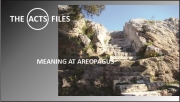 Yesterday we read about Paul’s proclamation of impeding judgment. His message, while reasoned very differently, didn’t differ from Jonah’s message to Nineveh centuries earlier. Both men called a people to repentance in order to avoid God’s judgment. The only significant difference between the two messages is that Jonah had set the judgment day as 40 days hence, while Paul’s message leaves the day open ended. When considering the creations complete history, Judgment day was near during Paul’s time. How much nearer is it for us?
Yesterday we read about Paul’s proclamation of impeding judgment. His message, while reasoned very differently, didn’t differ from Jonah’s message to Nineveh centuries earlier. Both men called a people to repentance in order to avoid God’s judgment. The only significant difference between the two messages is that Jonah had set the judgment day as 40 days hence, while Paul’s message leaves the day open ended. When considering the creations complete history, Judgment day was near during Paul’s time. How much nearer is it for us?
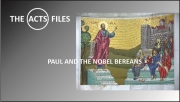 Once more in fear of mortal danger Paul, Silas and Timothy set out at night to the city of Berea (Acts 17.10-15). No doubt other’s accompanied them as well, as traveling at night was very dangerous. Upon their arrival Paul continued his pattern and first went to the city’s synagogue to teach the Jews about the Messiah. Paul had not yet found a new method for reaching the Europeans. The church is Thessalonica was mostly made of Gentiles (1 Thessalonians 1.9) and this would likely continue as he pushed farther from Jerusalem. What he found in Berea was surprising.
Once more in fear of mortal danger Paul, Silas and Timothy set out at night to the city of Berea (Acts 17.10-15). No doubt other’s accompanied them as well, as traveling at night was very dangerous. Upon their arrival Paul continued his pattern and first went to the city’s synagogue to teach the Jews about the Messiah. Paul had not yet found a new method for reaching the Europeans. The church is Thessalonica was mostly made of Gentiles (1 Thessalonians 1.9) and this would likely continue as he pushed farther from Jerusalem. What he found in Berea was surprising.
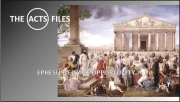 Paul and Apollos probably passed each other on the road without knowing it. When Apollos set off for Corinth from Ephesus, Paul was heading to Ephesus on his third missionary journey. Upon his arrival Acts 19.1-.10) Paul found a group who were in the same position as Apollos had been in, that is they knew of Jesus only up until the time of the death of John the Baptist. These former disciples of John (of which there were a dozen) left Jerusalem and settled in Ephesus. Just as Aquilla and Priscila completed Apollos’ knowledge of the Messiah, so Paul took the disciples of John under his tutelage.
Paul and Apollos probably passed each other on the road without knowing it. When Apollos set off for Corinth from Ephesus, Paul was heading to Ephesus on his third missionary journey. Upon his arrival Acts 19.1-.10) Paul found a group who were in the same position as Apollos had been in, that is they knew of Jesus only up until the time of the death of John the Baptist. These former disciples of John (of which there were a dozen) left Jerusalem and settled in Ephesus. Just as Aquilla and Priscila completed Apollos’ knowledge of the Messiah, so Paul took the disciples of John under his tutelage.
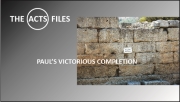 After ministering in Corinth for half a year the Jews were at wits end with Paul (Acts 18.12-.23). Luke describes their arrest of Paul as an ”attack” to assure we understand that brutality was involved. After his beat down they brought him before Gallio the proconsul of their region in hopes of his consent to a state execution. The Romans, however, were never anxious to enter the affairs of the Jews and this situation was no different.
After ministering in Corinth for half a year the Jews were at wits end with Paul (Acts 18.12-.23). Luke describes their arrest of Paul as an ”attack” to assure we understand that brutality was involved. After his beat down they brought him before Gallio the proconsul of their region in hopes of his consent to a state execution. The Romans, however, were never anxious to enter the affairs of the Jews and this situation was no different.
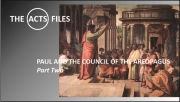 Paul stands before the council of the Areopagus (Acts 17.22-.31) and gives his opening remarks about his belief system. Throughout the speech we see evidence of Paul’s cleverness and command of the Greek language. Take the back-handed compliment he gives his listeners in his very first statement for example. He states that he has observed they are a very “religious” people. The Greek word translated religious can be interpreted as “devout” (a compliment) or as “superstitious” (an insult).
Paul stands before the council of the Areopagus (Acts 17.22-.31) and gives his opening remarks about his belief system. Throughout the speech we see evidence of Paul’s cleverness and command of the Greek language. Take the back-handed compliment he gives his listeners in his very first statement for example. He states that he has observed they are a very “religious” people. The Greek word translated religious can be interpreted as “devout” (a compliment) or as “superstitious” (an insult).
 When Paul arrived at Thessalonica (Acts 17.1-.9) he entered a city with a rich history. While an exact date of the cities founding is hard to come by, in 168 BC it became the capital of the second district of Macedonia. Located at the intersection of two important Roman roads (one from Italy and another from the Danube River to the Aegean Sea) it became the capital city of all of Macedonia in 146 BC. The cities importance to Rome became incalculable shortly before the birth of Jesus and continues to this day to be the second greatest city in all of Greece.
When Paul arrived at Thessalonica (Acts 17.1-.9) he entered a city with a rich history. While an exact date of the cities founding is hard to come by, in 168 BC it became the capital of the second district of Macedonia. Located at the intersection of two important Roman roads (one from Italy and another from the Danube River to the Aegean Sea) it became the capital city of all of Macedonia in 146 BC. The cities importance to Rome became incalculable shortly before the birth of Jesus and continues to this day to be the second greatest city in all of Greece.
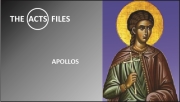 With Paul on his way back to Antioch Syria the story briefly shifts focus on the activity in Ephesus, where Priscila and Aquilla set up their business. Here we are introduced to a man named Apollos. Born to Jewish parents in Alexandria, Egypt he was raised with a cosmopolitan education. The world famous Library of Alexandria was the home of some of the oldest manuscripts, teachings and documents from around the globe. While we know much about the education of Paul, we must make assumptions about Apollos.
With Paul on his way back to Antioch Syria the story briefly shifts focus on the activity in Ephesus, where Priscila and Aquilla set up their business. Here we are introduced to a man named Apollos. Born to Jewish parents in Alexandria, Egypt he was raised with a cosmopolitan education. The world famous Library of Alexandria was the home of some of the oldest manuscripts, teachings and documents from around the globe. While we know much about the education of Paul, we must make assumptions about Apollos.
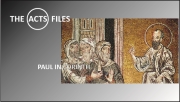 We don’t know how long Paul stayed in Athens after his presentation to the Areopagus council, but we do know that one member of the council came to faith is Jesus. Along with Councilman Dionysius and a prominent woman named Damarius, others also put their faith in Jesus. While Luke doesn’t tell us how many others, the language appears to imply that the “others” who followed were of the political camp or household of the two who were named.
We don’t know how long Paul stayed in Athens after his presentation to the Areopagus council, but we do know that one member of the council came to faith is Jesus. Along with Councilman Dionysius and a prominent woman named Damarius, others also put their faith in Jesus. While Luke doesn’t tell us how many others, the language appears to imply that the “others” who followed were of the political camp or household of the two who were named.
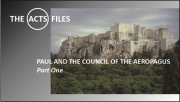 Not being a lay-about, Paul made good use of his time waiting for Silas and Timothy to catch up to him in Athens (Acts 17.16-.20). He conducted a reconnoiter of the great city and in doing so we are treated to a depiction of the culture of ancient Athens.
Not being a lay-about, Paul made good use of his time waiting for Silas and Timothy to catch up to him in Athens (Acts 17.16-.20). He conducted a reconnoiter of the great city and in doing so we are treated to a depiction of the culture of ancient Athens.
 With the other prisoner’s secured and the jailer a new follower of Jesus, Paul and Silas are welcomed into the guards home where his household puts their faith in the Lord and tends to the apostles wounds (Acts 16.33). At nearly one o’clock in the morning the Spirit of God is working overtime in the life of this family and its servants. Before sunrise everyone is baptized and served a hearty breakfast before returning to the prison.
With the other prisoner’s secured and the jailer a new follower of Jesus, Paul and Silas are welcomed into the guards home where his household puts their faith in the Lord and tends to the apostles wounds (Acts 16.33). At nearly one o’clock in the morning the Spirit of God is working overtime in the life of this family and its servants. Before sunrise everyone is baptized and served a hearty breakfast before returning to the prison.
